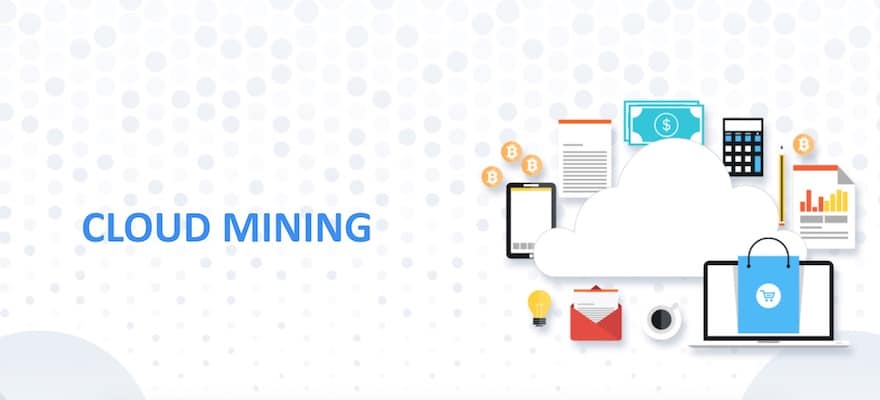Cloud mining is a hands-off way of earning cryptocurrency by renting computing power from third-party sources.
Decades ago, every major software computer company would maintain basements full of computers that crunched numbers day and night. Rooms the size of gymnasiums would be devoted to the servers that keep the lights on.
That all changed in the era of cloud computing. Instead of sacrificing precious underground real estate, software companies began to rent computing power from warehouses full of powerful machines hosted elsewhere.
Cloud mining brings this same principle – outsourcing computational work – to cryptocurrency mining, the process of running powerful computers that mine for coins like bitcoin, litecoin and dogecoin. Instead of buying expensive computers to mine these coins yourself, you can rent the computing power of a specialized miner from a cloud mining company based anywhere in the world.
What’s more, when you pay for cloud mining services, you’re renting part of a pool of a great deal of computational power, meaning that you’re more likely to beat other, less powerful bitcoin miners that are racing to generate a winning hash that earns them bitcoin.
Cloud mining only applies to proof-of-work systems, like Bitcoin and the original Ethereum blockchain, which mine new cryptocurrencies with sheer computational brute force.
Cloud mining does not apply to proof-of-stake systems, which let those who lock up a number of coins within the network participate in validating new blocks and earn newly minted cryptocurrency in return. However, many staking services like Ethereum 2.0, Solana and EOS let you delegate your coins to other validators to earn a cut of the profits, which is functionally similar to cloud mining.
How to start cryptocurrency cloud mining
Getting started in cloud mining requires none of the setup that regular cryptocurrency mining does. You don’t have to buy specialized hardware, store it anywhere or pay for electricity bills.
Instead, you have to pick a successful mining pool, rent some hardware from it and wait until the mining pool generates money. You also have to pick a cryptocurrency. Bitcoin, ethereum and dogecoin house the largest mining pools, according to MiningPoolStats.com.
Antpool, Poolin, f2pool and Slush Pool are among the largest bitcoin mining pools that serve retail consumers. Foundry Digital is a large North American mining pool that services institutional investors.
To get started with a cloud mining service, you need to:
Pick a cloud mining provider and a coin you wish to mine.
Sign up for an account.
Each site is slightly different; fees vary, as do the services and miners offered.
To start on Antpool, a mining pool that accounts for about 15% of bitcoin’s hashrate, you have to create an account, download special mining configuration software and pick a miner. The site lets you sort mining machines by efficiency and profitability. You can rent miners and earn payouts periodically in the currency you’re mining.

Is cloud mining profitable?
Yes, it can be. There are upfront costs – you’ll have to pay to rent these miners, and mining pools can also take a cut of your profits – but it can be worthwhile.
Your profit will depend on the power of the miners used by the pools – newer miners will boast better specs than older models and will likely generate higher returns – and the state of the market. For instance, if you choose to hold onto your bitcoin instead of selling it for regular money, like the U.S. dollar, you’ll remain exposed to the price of bitcoin.
Different coins pose different currency risks. On Antpool, for instance, bitcoin pays out $0.2900 per terahash, while ethereum pays out $0.3044. These small differences can compound if you rent miners with greater hash power.
Is cloud mining risky?
Cloud mining is risky insofar that you are relying on someone else to mine cryptocurrency, without ever actually checking they own the hardware necessary to mine bitcoin, or whichever coin you choose.
Lots of fraudulent cloud mining services claim to be mining bitcoin on your behalf yet just suck up your money instead. USDminer is one of many examples. They often operate completely anonymously, making it impossible to know who manages the platform, and promise extremely high rates of return over a short period of time. Other red flags include:
Spelling mistakes on the website.
Anonymous testimonials that show stock images of people’s faces.
A false company address or complete lack of one.
Sticking to well-known mining pools will greatly minimize this risk.
As mentioned, you’re also reliant on the health of the market. Bitcoin and other mineable cryptocurrencies are highly volatile – meaning their prices can change dramatically within a short period of time. This poses a risk to your invested capital, as any coins you do earn from mining have the potential to crash in price.
There’s also a great deal of regulatory risk for cloud mining. A vast number of cloud miners used to be housed in China, for instance, since the country offered cheap electricity, and in wet seasons the industry used green energy, too. But in the spring of 2021, China cracked down on its cryptocurrency mining industry and forced miners to shut up shop or shift elsewhere. That meant anyone renting cloud miners from Chinese pools lost income.
Other countries could also ban cryptocurrency mining. The process requires huge amounts of energy, some of it from burning fossil fuels, and a handful of governments consider it a scourge on the environment.
However, it’s worth noting these risks are much lower for people who cloud mine than if you were to buy the mining machines yourself. Specialized hardware can be very expensive, not to mention the running and maintenance costs associated with mining. The hardware you bought to mine cryptocurrency might not be worth an awful lot if the demand for mining was wiped out by an economic crash.


